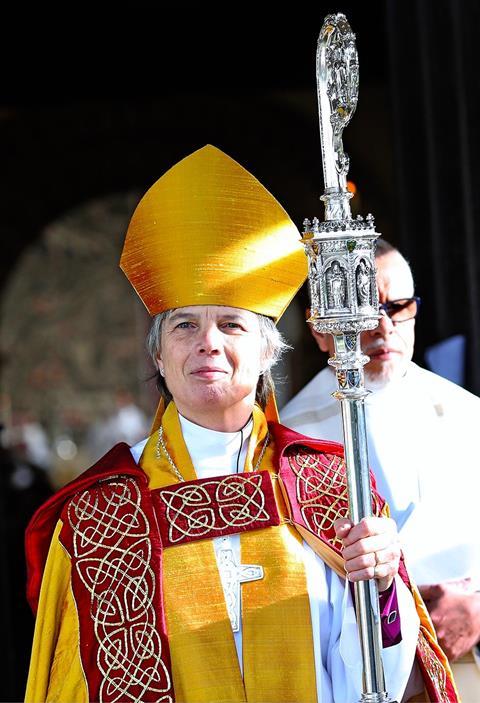Those who are opposing Cherry Vann’s appointment as the new Archbishop of Wales on the basis of her sexuality are conveniently forgetting that they once opposed the ordination of women altogether. Prof Helen King says their arguments are hypocritical and outdated

The Church in Wales now has a new Archbishop. Most Rev Cherry Vann was ordained as a deacon in the Church of England in 1989, before women could be priests. In 1994, she was in the first cohort of women to be priested. Before her consecration as Bishop of Monmouth in 2020, she worked in parish and chaplaincy ministry as Area Dean and then Archdeacon in the Manchester diocese.
So far, so typical of the pattern of ministry of someone who goes on to be called to serve as a bishop and then an archbishop. By all accounts, her wide range of experience is enhanced by the many gifts she brings to this role; a deep faith, vision and care for individuals.
Women in history
A decade ago, however, her election would have prompted a torrent of comments about her gender. How can a woman have authority over a man (see ‘clobber verses’ such as 1 Timothy 2:12)? As for church structures, how can an “overseer” be anyone but the husband of one wife (1 Timothy 3:2)? So how can a woman – or, indeed, a man who is divorced and remarried – serve as a bishop?
Archbishops, of course, don’t feature in the New Testament.
Today, different provinces of the Anglican Communion take different stances on this issue. The Church in Wales voted in favour of women bishops in 2013. In 2023, GAFCON was still arguing for a moratorium on women bishops, although a handful of their provinces have consecrated women in these roles.
Archbishop Cherry is living in a committed and legal relationship within the decisions made by her own Church
In the run-up to the appointment of women bishops in the Church of England, conservative groups were strongly opposed. Some argued that women being ordained for ministry of any kind was a “first-order issue”. But that view was not unanimous, even among traditionalists.
In 2005, the conservative evangelical group Reform stated that women bishops were a first-order issue because they challenged church doctrine. But by 2009, the then-Chair of the Church of England Evangelical Council (CEEC) was reported in the Church Times as refuting this position.
Taking issue
A decade after women first became bishops in both the Church of England and the Church in Wales, conservative commentators seem to have conveniently forgotten that they claimed – or in some cases still claim – that women could not take on these roles because of their gender.
Instead, they are now focussed on Archbishop Cherry’s sexuality, as a lesbian in a civil partnership. In entirely predictable language, the statement from GAFCON calls this partnership “immoral” while claiming Archbishop Cherry is a “false teacher” who evokes the Jezebel of Revelation 2:20.
It goes on to distinguish between “authentic Anglican orthodoxy” and “Anglican revisionists”. Many progressive Christians would rightly object to this use of the term ‘orthodox’, as they hold entirely traditional views on the Trinity, the incarnation and the resurrection of Jesus Christ.
Andrea Williams of Christian Concern states that Archbishop Cherry is “publicly living in deliberate rejection” of doctrines she has sworn to uphold. But she is living in a long-standing, committed and legal relationship, and within the decisions made by her own Church.
Making space
In 2014, the Standing Doctrinal Commission of the Church in Wales produced its report on same-sex partnerships. Four years later, an informal poll of clergy and laity stated “that it is pastorally unsustainable for the Church to make no formal provision for those in same-sex relationships”.
This led to a decision in 2021 that, for an experimental period of five years, couples in civil relationships can be blessed in a special church service. No priest is obliged to take such a service, the words of which affirm that “when two people commit themselves to one another in a lifelong covenant of love and faithfulness their relationship reveals to us the loving purposes of God and the unconditional nature of divine love for the whole human family.”
Conservative commentators are now focussed solely on Archbishop Cherry’s sexuality
Earlier this year, the process of deciding whether to continue with these services - or even move towards same-sex marriage in church - began. Meetings were held in all the dioceses. In contrast to the process followed for the Church of England’s Prayers of Love and Faith (in which prayers are allowed in an existing service but not in a special one) the Church in Wales meetings simply involve people stating their views and then having a period of silent reflection.
Outside conservative evangelical circles, I see remarkably little interest in Archbishop Cherry’s civil partnership; there is far more discussion of her competence in the Welsh language. Just as having a woman as bishop or archbishop affirms women’s value in God’s eyes (as well as their gifts and skills), so having a bishop who is in a committed and faithful relationship with someone of the same sex affirms lesbian and gay people.
We should give thanks for Archbishop Cherry’s ministry and pray for her and for her partner, Wendy, as they offer themselves and their gifts to God.
For an alternative view, read Andrea Williams’ piece here



































6 Readers' comments